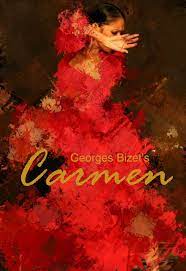Carmen

by Georges Bizet
”And that Gypsy…if there really are witches, she most certainly is one!”
One of the most often-performed, and best-loved of all operas, Carmen is rich in memorable music and gritty drama. Enjoy it more fully than ever before in this very entertaining and moving new English performing translation.
Excerpt:
Act II, Don José: “La fleur que tu m’avais jetée…”
“I kept the flower that you gave me. I had it with me in my cell.
It dried and withered in a few days, but never lost its sweet perfume.
And in those dark and lonely hours, to my face I pressed it, and inhaled it,
became intoxicated by its scent. And every night I dreamt of you.
At first, in anger, I cursed you, detested you, and myself,
and asked myself, among all men, why did Fate have to send you to me?
Then I realized I couldn’t hate you, that without you, my life was empty.
And I was left with a single hope, one single hope, one sole desire: to be with you once more.
For all you have to do is appear, just glance at me with your haunting eyes
to take possession of my soul. Oh, please, Carmen, just love me and I’ll be your slave!
Carmen, I beg you!”
Libretto copyright Kenneth Jakobs 2024
All rights reserved
Notes
Carmen premiered in 1875, a few months before the death of its composer at age 36. Bizet, sadly, didn’t live to see the great success that it achieved. Though the music is extremely melodic, the opera was considered very modern and shocking then, both musically and dramatically, and is considered by some to have pointed the way to the late 19th century style of Italian realism called verismo. It is interesting to consider that Carmen was a contemporary of the Ring Cycle of Wagner, and Verdi’s Aida. For it’s time, it was very melodically and harmonically chromatic, causing some to even refer to it as “Wagnerian”.
In addition to the immortal music, here are classic operatic characters: Carmen, the sultry and willful Gypsy, and her naïve and sentimental lover, Don José, whose rejection ultimately leads him to murder the object of his obsessive love.
Originally written in the style of opéra-comique, i.e., musical numbers interspersed with spoken dialogue, in the 20th century it was most often performed with sung recitatives composed after Bizet’s death, more in the style of a grand opera. But starting in the 1960’s, it has often been produced as originally intended, with dialogue instead of recitatives. Both versions have been recorded. There is no agreed-upon standard version. My translation includes both versions, which offers an interesting comparison.
